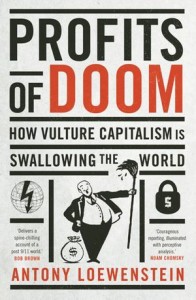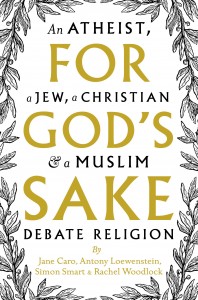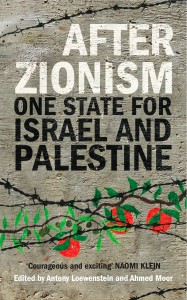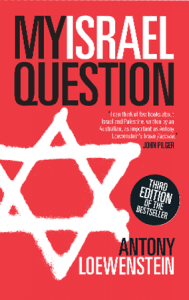Little scrutiny of mining companies in Greenland
My weekly Guardian column:
This is a story about an Australian company you’ve never heard of, operating in a nation that rarely enters the global media: Greenland. It’s a story about the intense search for energy sources in a world that’s moving away from the dirtiest fossil fuels.
Aleqa Hammond, the prime minister of Greenland, is the first woman to lead this autonomous country within the Kingdom of Denmark. She also welcomes the financial opportunities from climate change and a melting Arctic Circle.
“I simply refuse to be the victimised people of climate change”, she told Business Week this month. “This time we have other options than just hunting. We have the right now to our own underground.”
In October last year, Hammond pushed legislation through Greenland’s parliament to overturn a 25 year old ban on the extraction of radioactive materials, including uranium, despite countless leading environmental NGOs urging otherwise. It attracted global interest from the rare earth and uranium industries, including from China. Concerns were also raised about Greenland’s ability to manage a toxic substance in the wake of Fukushima and Chernobyl.
The company Greenland Minerals and Energy Limited (GMEL) is based in Perth, Western Australia. This year GMEL announced a major step forward in their plan to open one of the world’s largest uranium mines in southern Greenland, at Kvanefjeld. The mine will also produce fluoride, thorium and other rare earths.
There is still significant opposition to the Kvanefjeld project. The Ecological Council, a Danish NGO, organised a conference to discuss the potential contamination risks in March, noting that the mine poses serious risks for the inhabitants of the nearby village, Narsaq. Many locals told the BBC that they worried about pollution and challenges to traditional ways of life if GMEL moved ahead with its plans. Unsurprisingly, Danish green groups have pushed for a continued ban on uranium mining. They claim that rare earth elements can be extracted without uranium mining in Greenland.
This would have been an important but fairly typical contest over resources, but after issues surrounding the ownership and status of Perth-based GMEL were raised in the Greenlandic parliament, the prospects of the Australian firm may be in jeopardy.
Late last year, Greenland MP Sara Olsvig (tipped by some as a future prime minister) wrote to the country’s minister of industry and minerals, Jens-Erik Kirkegaard. She demanded details about any and all of GMEL’s shareholders, after Australian media outlets had raised allegations about both the company back in 2009 (here and here) and mining prospector Mihran Shemesian, also known as “Mick Many Names“.
In 2009, Fairfax media claimed that Shemesian controlled more than 20% of GMEL stock. Range Resources, another company tied to Shemesian, had earlier been accused of paying the disputed government of the Puntland State of Somalia, linked to Somali rebels, more than $US6m ($A9.3m) for resource rights to the region. Since then, there have been very few stories about him.
Kirkegaard responded that the government dismissed any concerns about GMEL – “the alleged events all occurred outside Greenland’s jurisdiction” – and claimed that the company didn’t own an exploration license anyway, so there was nothing to worry about. This isn’t quite the case: Greenland Minerals and Energy A/S (GME), the firm granted the licence, is the wholly-owned Greenlandic subsidiary of GMEL.
So is “Mick Many Names” Shemesian involved with GMEL? John Mair, the company’s executive director, told me he isn’t “registered as a shareholder”. But he would not guarantee that Shemesian has no involvement with GMEL.
Mair is proud of the Kvanefjed project, where “risks can be appropriately mitigated”. GMEL was “working with Greenland to help establish a secure and viable economy that will help sustain their increasing political independence,” he told me, adding that he was “optimistic” GMEL would be granted a mining license in the foreseeable future because “we have much local community support in Greenland”.
A key shareholder in GMEL is Perth-based geologist Greg Barnes, founder and CEO of Tanbreez. He told me by phone from Singapore that he has personally invested $40m towards mining possibilities in Greenland. He says he has known Shemesian for 30 years and “has heard that he has a 50% share in GMEL and I’ve heard that he has 0%. I have no relationship with him.”
But in December last year he told Grønlandsposten, a Greenlandic newspaper that, “he and Shemesian could probably fire GMEL’s board if they wanted to”. He told me that this referred to the make-up of GMEL many years ago – not today.
“[Greenland] is the size of Western Australia but it has no mines”, he said. “In Western Australia an application for mining would take three months but in Greenland it takes years.” A vast part of Greenland has been “staked out by a number of Perth companies.” Barnes isn’t concerned about climate change “because it didn’t really show up in places like Greenland apart from some ice sheets reducing”.
There is another view. Niels Henrik Hooge is a Danish consultant who works with green NGOs. He’s been at the forefront of the campaign against uranium mining in Greenland. He says to me that the people of Greenland are “split down the middle regarding the repeal of the [uranium] ban.”
Hooge explains that the “mineral authorities” have fed the public disinformation over the last years but the tide may be turning, with growing concerns over environmental effects and the leftist party Inuit Ataqatigiit pledging to roll back the repeal if it wins back power.
The prospect of a relatively unknown Australian company exploiting massive untapped resources in Greenland deserves a robust public and political debate. It has thus far received nothing in Australia, and little in Denmark and Greenland. In an age of worsening climate change, mining uranium is an arguably unsafe and potentially explosive answer to the problem.
 Vulture capitalism has seen the corporation become more powerful than the state, and yet its work is often done by stealth, supported by political and media elites. The result is privatised wars and outsourced detention centres, mining companies pillaging precious land in developing countries and struggling nations invaded by NGOs and the corporate dollar.
Best-selling journalist Antony Loewenstein travels to Afghanistan, Pakistan, Haiti, Papua New Guinea and across Australia to witness the reality of this largely hidden world of privatised detention centres, outsourced aid, destructive resource wars and militarized private security. Who is involved and why? Can it be stopped? What are the alternatives in a globalised world?
Vulture capitalism has seen the corporation become more powerful than the state, and yet its work is often done by stealth, supported by political and media elites. The result is privatised wars and outsourced detention centres, mining companies pillaging precious land in developing countries and struggling nations invaded by NGOs and the corporate dollar.
Best-selling journalist Antony Loewenstein travels to Afghanistan, Pakistan, Haiti, Papua New Guinea and across Australia to witness the reality of this largely hidden world of privatised detention centres, outsourced aid, destructive resource wars and militarized private security. Who is involved and why? Can it be stopped? What are the alternatives in a globalised world? 

 The 2008 financial crisis opened the door for a bold, progressive social movement. But despite widespread revulsion at economic inequity and political opportunism, after the crash very little has changed.
Has the Left failed? What agenda should progressives pursue? And what alternatives do they dare to imagine?
The 2008 financial crisis opened the door for a bold, progressive social movement. But despite widespread revulsion at economic inequity and political opportunism, after the crash very little has changed.
Has the Left failed? What agenda should progressives pursue? And what alternatives do they dare to imagine?
 The Blogging Revolution, released by
The Blogging Revolution, released by  The best-selling book on the Israel/Palestine conflict,
The best-selling book on the Israel/Palestine conflict,